

Pyramide des besoins de Maslow. Group relations: The people dynamic. Social interactions in economics, management, and politics. Le sexe autour du monde. Le sexe dans tous ses états. Sociology of the Web. List of sociologists. 50 Best Sociology Books of All Time. Catégorie:Branche de la sociologie. Catégorie:Sociologie de la déviance. SOCIOLOGY. Sociologie. Sociology. Liens Socio. Sociomapping. Sociomapping is a method developed for processing and visualization of relational data (e.g. social network data).
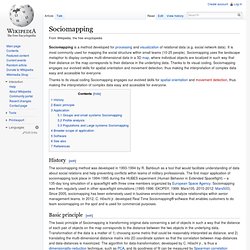
It is most commonly used for mapping the social structure within small teams (10-25 people). Sociomapping uses the landscape metaphor to display complex multi-dimensional data in a 3D map, where individual objects are localized in such way that their distance on the map corresponds to their distance in the underlying data. Thanks to its visual coding, Sociomapping engages our evolved skills for spatial orientation and movement detection, thus making the interpretation of complex data easy and accessible for everyone.
Thanks to its visual coding Sociomapping engages our evolved skills for spatial orientation and movement detection, thus making the interpretation of complex data easy and accessible for everyone. History[edit] The sociomapping method was developed in 1993-1994 by R. Basic principle[edit] Application[edit] Groups and small systems Sociomapping[edit] Software[edit] SocioSite. Portal:Sociology. OpenEdition : portail de ressources électroniques en sciences humaines et sociales. The Society Pages.
ISSC. Revue du MAUSS permanente. La Revue du MAUSS (Mouvement anti-utilitariste en sciences sociales) The Battle for Your Mind: Brainwashing Techniques Being Used On The Public By Dick Sutphen. Authoritarian followers Mind Control Subliminals By Dick Sutphen Summary of Contents The Birth of Conversion The Three Brain Phases How Revivalist Preachers Work Voice Roll Technique Six Conversion Techniques 1. keeping agreements 2.physical and mental fatigue 3. increase the tension 4.
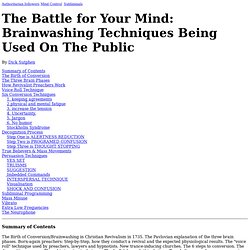
Uncertainty. 5. Jargon 6. No humor Stockholm SyndromeDecognition Process Step One is ALERTNESS REDUCTION Step Two is PROGRAMED CONFUSION Step Three is THOUGHT STOPPINGTrue Believers & Mass Movements Persuasion Techniques YES SET TRUISMS SUGGESTION Imbedded Commands INTERSPERSAL TECHNIQUE Visualisation SHOCK AND CONFUSIONSubliminal Programming Mass Misuse Vibrato Extra Low Frequencies The Neurophone.
Science: Social Sciences. Peace Education in Action, Canadian Centres for Teaching Peace. Women as Academic Authors, 1665-2010 - Special Reports. 1665-1970321,368 authors 1971-1990609,635 authors 1991-20101.1 million authors All years2.0 million authors Anthropology 27.2% female authors(45,099 authors) 32 subfields Classical studies.

Craig McKie. Social theory. Great Diagrams in Anthropology , Linguistics, and Social Theory. 2606027019_676d182260.jpg (Image JPEG, 500x366 pixels) Trifunctional hypothesis. This part of a 12th-century Swedish tapestry has been interpreted to show, from left to right, the one-eyed Odin, the hammer-wielding Thor and Freyr holding up wheat.
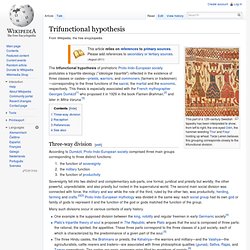
Terje Leiren believes this grouping corresponds closely to the trifunctional division. The trifunctional hypothesis of prehistoric Proto-Indo-European society postulates a tripartite ideology ("idéologie tripartite") reflected in the existence of three classes or castes—priests, warriors, and commoners (farmers or tradesmen)—corresponding to the three functions of the sacral, the martial and the economic, respectively. This thesis is especially associated with the French mythographer Georges Dumézil[1] who proposed it in 1929 in the book Flamen-Brahman,[2] and later in Mitra-Varuna.[3]
Framework for a Strengths-Based Society. The world as we know it is in disruption.
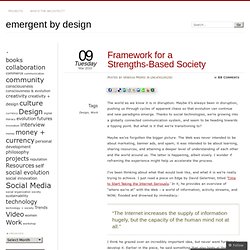
Maybe it’s always been in disruption, pushing us through cycles of apparent chaos so that evolution can continue and new paradigms emerge. Thanks to social technologies, we’re growing into a globally connected communication system, and seem to be heading towards a tipping point. But what is it that we’re transitioning to? Maybe we’ve forgotten the bigger picture. ASSESSMENT OF SOCIETAL SECURITY IN RECENT PAST AND TODAY. POLICING IN CENTRAL AND EASTERN EUROPE: Comparing Firsthand Knowledge with Experience from the West, © 1996 College of Police and Security Studies, Slovenia Miran Mitar At first the article sketches some "domestic" approaches (before the short war for the independence of Slovenia in 1991) to assessment of societal security from the viewpoint of internal security.
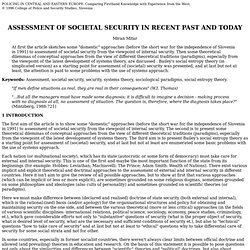
Then some theoretical dilemmas of conceptual approaches from the view of different theoretical traditions (paradigms), especially from the viewpoint of the latest development of systems theory, are discussed . Bailey's social entropy theory (in simplicated version) as a starting point for assessment of (societal) security was presented, and at last but not at least, the attention is paid to some problems with the use of systems approach. Keywords: Assessment, societal security, security, systems theory, sociological paradigms, social entropy theory. Les Classiques des sciences sociales. Ethnographiques.org - Revue en ligne de sciences humaines et sociales. Science overturns view of humans as naturally ‘nasty’ By Agence France-PresseMonday, February 20, 2012 20:50 EDT VANCOUVER, Canada — Biological research increasingly debunks the view of humanity as competitive, aggressive and brutish, a leading specialist in primate behavior told a major science conference.
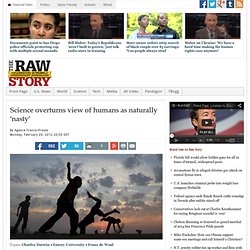
“Humans have a lot of pro-social tendencies,” Frans de Waal, a biologist at Emory University in Atlanta, told the annual meeting of the American Association for the Advancement of Science. New research on higher animals from primates and elephants to mice shows there is a biological basis for behavior such as cooperation, said de Waal, author of “The Age of Empathy: Nature’s Lessons for a Kinder Society.” Until just 12 years ago, the common view among scientists was that humans were “nasty” at the core but had developed a veneer of morality — albeit a thin one, de Waal told scientists and journalists from some 50 countries.
“Human morality is unthinkable without empathy.” Copyright 2012 The Raw Story. Navigating the Space Between Brilliance and Madness. 40 Healthy Relationship Signs. Dilemme du prisonnier. Un article de Wikipédia, l'encyclopédie libre.

Le dilemme du prisonnier, énoncé en 1950 par Albert W. Tucker à Princeton caractérise en théorie des jeux une situation où deux joueurs auraient intérêt à coopérer, mais où, en absence de communication entre les deux joueurs, chaque joueur choisira de trahir l'autre lorsque le jeu n'est joué qu'une fois. La raison à cela est que si un coopère et l'autre trahit, le coopérateur est fortement pénalisé. Pourtant si les deux joueurs trahissent, le résultat leur est moins favorable que si les deux avaient choisi de coopérer.
Le dilemme du prisonnier. Dans le jeu du dilemme du prisonnier, deux détenus sont emprisonnés dans des cellules séparées.

La police fait à chacun des deux le même marché: "Tu as le choix entre dénoncer ton complice ou non. Si tu le dénonces et qu'il te dénonce aussi, vous aurez une remise de peine d'un an tous les deux. Aléa moral. Un article de Wikipédia, l'encyclopédie libre.

L’aléa moral (ou moral hazard en anglais) désigne pour l'économiste Adam Smith un effet pervers qui peut apparaître dans certaines situations de risque, dans une relation entre deux agents ou deux parties contractantes : c'est plus précisément la perspective qu'un agent, isolé d'un risque, se comporte différemment que s'il était totalement lui-même exposé au risque. Ce que racontent nos poubelles - L'EXPRESS. Moral hazard. In economic theory, a moral hazard is a situation where a party will have a tendency to take risks because the costs that could result will not be felt by the party taking the risk.